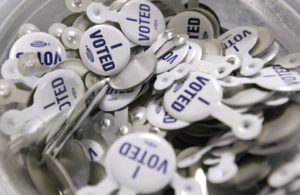President Lyndon B. Johnson announced a “War on Poverty” as part of his 1964 State of the Union address, promising and mandating the nation not simply treat the symptoms of the poor, but fetter out and eliminate root causes.
“Today, for the first time in our history, we have the power to strike away the barriers to full participation in our society,” he said. “Having the power, we have the duty.”
This appears to be a duty Gov. Terry Branstad is willing to shirk.
By executive order, former Gov. Tom Vilsack said people convicted of crimes, who had served their sentences, should be able to fully participate as citizens by casting ballots and standing as candidates for public office.

Yet on the first day Branstad 2.0 took office — and, according to media accounts, following the urging of newly elected Secretary of State Matt Schultz — Vilsack’s executive order was reversed. Iowans previously convicted of crimes must once again submit to an onerous process if they hope to have their voting rights restored. The move has made Iowa’s process one of the most difficult in the nation, and stands against a national trend to allow those who have made a mistake another chance.
The 29-question application requires those previously convicted to provide such information as the name and current address of prosecuting attorneys, defense attorneys and judges who heard the case. Status of income tax returns, alimony and child support payments is required. Fines either must be paid in full or as part of a payment plan with a good-faith history. While the application does not require a fee, it requires submission of another state report that does.
What becomes clear in reading the application and supporting documentation is a focus not on rehabilitation or even retribution, but on monetary obligation.
It has become one more roadblock to those in poverty being able to fully participate in society.
A 2012 report by the Associated Press notes that although 8,000 felons in Iowa had finished their sentences or been released from community supervision, less than a dozen had successfully completed the Governor’s application process. Today, fewer than 50 people have had their voting rights restored.
While this alone should be reason for concern, the situation is intensified by continued reports of unprecedented disparity within Iowa’s justice system. Specifically, Iowa charges and convicts per capita more people of color than any other state.
Today, according to advocacy group The Sentencing Project, one of every four black adults in Iowa cannot vote due to a criminal conviction and, of those unable to cast a ballot, about 70 percent have completed their sentences. Iowa’s rate is more than three times the national average.
Most of those impacted by Branstad’s decision are non-violent offenders, some have never set foot in a prison. Nonetheless, their ability to influence the laws under which they live is restricted to no further benefit of society.
It is 50 years past Johnson’s call for the nation to root out poverty, but it isn’t too late for Branstad to fulfill his duty.
This column by Lynda Waddington originally published in The Gazette on Aug. 9, 2014. Photo credit: Jim Slosiarek/The Gazette
